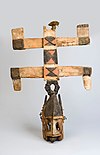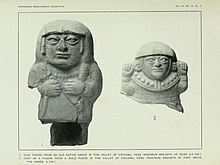| Part of a series on |
| Traditional African religions |
|---|
 |

| Part of a series on |
| Anthropology of religion |
|---|
 |
| Social and cultural anthropology |
African divination is divination practiced by cultures of Africa.
Divination is an attempt to form, and possess, an understanding of reality in the present and additionally, to predict events and reality of a future time.[1]
Cultures of Africa to the year circa C.E. 1991 were still performing and using divination, both within the urban and the rural environments. Diviners might also fulfill the role of herbalist.[2] Divination might be thought of as a social phenomenon,[3] and is thought of as central to the lives of people in societies of Africa (circa 2004 at least).[4]
Of the five regions of Africa,[5][6] of which there are 54 countries of Africa,[7] the proceeding countries are shown in the contents of this article:
- North:[8] Algeria,[9] Egypt.[10][11][12]
- East:[13] Djibouti[14] Eritrea,[15] Ethiopia,[16] Kenya,[2] Sudan,[2][5] Uganda.[2]
- Central:[17][18] Burundi,[19] Central African Republic,[1] the Democratic Republic of Congo[20][21]
- South:[22] Angola,[23] Botswana,[24] Mozambique,[25][26] South Africa.[2]
- West:[27] Benin;[28][29] Burkina Faso;[2] Cameroon;[30] Côte d'Ivoire;[20] western Ghana;[31] Nigeria;[32] the Serer of Gambia, Senegal and Mauritania;[33][34][35][36][37] Sierra Leone; Togo[2]
and,
- ^ a b J. C. Woodfork (2006). Culture and Customs of the Central African Republic. Greenwood Publishing Group. p. 31. ISBN 978-0313332036. Retrieved January 10, 2017.
- ^ a b c d e f g h Cite error: The named reference
P.M. Peekwas invoked but never defined (see the help page). - ^ L. S. Grillo (May 28, 2013). Divination: Perspectives for a New Millennium. Ashgate Publishing, Ltd, (edited by Dr P. Curry – University of Wales). p. 41. ISBN 978-1-4094-8113-3. Retrieved December 26, 2015.
- ^ M. Alpheus Masoga (University of Natal) (2004). Becoming Ngaka: Coming to terms with Oral Narrative Discourses (in) Orality, Literacy, and Colonialism in Southern Africa. BRILL. p. 217. ISBN 978-9004130869. Retrieved December 26, 2015.Issue 46 of Semeia studies
- ^ a b users.clas.ufl.edu/rserra/The%20Main%20Five%20Regions%20of%20Africa.doc The Main Five Regions of Africa, College of Liberal Arts and Sciences - The University of Florida. Retrieved January 12, 2017.
- ^ H. Holland (September 26, 2012). African Magic. Penguin UK. ISBN 978-0143527855. Retrieved January 12, 2017.
- ^ Countries of Africa Britannica. Retrieved December 21, 2016.
- ^ J. M. Abun-Nasr, B. H. Warmington, M. Brett - North Africa Britannica online. Retrieved January 12, 2017.
- ^ Susan Slyomovics (2014). Algerian Women's Būqālah Poetry: Oral Literature, Cultural Politics, and Anti-Colonial Resistance (PDF). University of California, Journal of Arabic Literature, BRILL. Archived from the original (PDF) on December 23, 2016. Retrieved December 22, 2016.
- ^ D. W. Nabudere (2011). Afrikology, Philosophy and Wholeness: An Epistemology. African Books Collective. p. 47. ISBN 978-0-7983-0255-5. Retrieved December 25, 2015.
- ^ E. L. Harris (September 1, 1998). Ancient Egyptian Divination and Magic. Weiser Books. ISBN 978-1-57863-036-3. Retrieved December 25, 2015.
- ^ E. A. Wallis Budge (1930). Amulets and Superstitions: The Original Texts with Translations and Descriptions of a Long Series of Egyptian, Sumerian, Assyrian, Hebrew, Christian, Gnostic, and Muslim Amulets and Talismans and Magical Figures, with Chapters on the Evil Eye, the Origin of the Amulet, the Pentagon, the Swastika, the Cross (pagan and Christian), the Properties of Stones, Rings, Divination, Numbers, the Kabbâlâh, Ancient Astrology, Etc. Courier Corporation. p. 443. ISBN 978-0-486-23573-8. Retrieved December 25, 2015.
- ^ H. G. Marcus, D. A. Low - East Africa Britannica online. Retrieved January 12, 2017.
- ^ C. Skutsch (November 7, 2013). Encyclopedia of the World's Minorities. Routledge. p. 12. ISBN 978-1135193881. Retrieved January 13, 2017.
- ^ T. G. Gebremedhin, G. H. Tesfagiorgis (2008). Traditions of Eritrea: linking the past to the future. Red Sea Press. ISBN 9781569022221. Retrieved January 13, 2017....Eritrean witch doctors to drive evil spirits away from individuals suffering from mental health problems. Witch doctors involved in the act of divination .... (open link shows multiple sources)
- ^ R. Devisch (October 28, 2013). Theoretical Explorations In Africa. Routledge. p. 69. ISBN 978-1136137860. Retrieved January 10, 2017.
- ^ D. Birmingham - Central Africa Britannica online. Retrieved January 12, 2017.
- ^ E.K. Eggers, R. Lemarchand - Burundi Britannica online. January 12, 2017.
- ^ E. W. Herbert (1984). Red Gold of Africa: Copper in Precolonial History and Culture. University of Wisconsin Press. p. 262. ISBN 978-0299096045. Retrieved January 6, 2017.
- ^ a b A. LaGamma; J. Pemberton; MOMA (P. de Montebello) (2000). Art and Oracle: African Art and Rituals of Divination. Metropolitan Museum of Art. pp. 5, 7, 8. ISBN 978-0-87099-933-8. Retrieved December 25, 2015.
- ^ D. Kabozi (S. L. Danver) (March 10, 2015). Native Peoples of the World: An Encyclopedia of Groups, Cultures and Contemporary Issues. Routledge. p. 72. ISBN 978-1-317-46400-6. Retrieved December 25, 2015.
- ^ S. E. Marks - Southern Africa Britannica online Retrieved January 12, 2017.
- ^ Adebayo Oyebade (2007). Angola. Greenwood Publishing Group. p. 45. ISBN 978-0313331473. Retrieved December 22, 2016.
- ^ Cite error: The named reference
R. Werbnerwas invoked but never defined (see the help page). - ^ Cite error: The named reference
Mozambiquewas invoked but never defined (see the help page). - ^ E. MacGonagle, "Living with a Tyrant: Ndau Memories and Identities in the Shadow of Ngungunyana", The International Journal of African Historical Studies, January 1, 2008. Accessed January 12, 2017.
- ^ J.D. Fage - Western Africa Britannica online. Retrieved January 12, 2017.
- ^ Cite error: The named reference
Kate Ezrawas invoked but never defined (see the help page). - ^ Cite error: The named reference
N.S. Murrellwas invoked but never defined (see the help page). - ^ W. van Beek (2013). Reviewing Reality: Dynamics of African Divination. LIT Verlag Münster. p. 185. ISBN 978-3-643-90335-8. Retrieved December 25, 2015.Volume 50 of African Studies
- ^ A. Dalby (October 28, 2015). Dictionary of Languages: The definitive reference to more than 400 languages. Bloomsbury Publishing. p. 80. ISBN 978-1-4081-0214-5.
- ^ Cite error: The named reference
W.R. Bascomwas invoked but never defined (see the help page). - ^ Cite error: The named reference
Richard 1was invoked but never defined (see the help page). - ^ Cite error: The named reference
Gravrand 2was invoked but never defined (see the help page). - ^ Cite error: The named reference
Galvan 3was invoked but never defined (see the help page). - ^ Cite error: The named reference
Kalis 4was invoked but never defined (see the help page). - ^ Cite error: The named reference
Xooywas invoked but never defined (see the help page). - ^ C. Shaw (1996). The Post-colonial Literature of Lusophone Africa. C. Hurst & Co. Publishers. p. 260. ISBN 978-1850652502. Retrieved January 10, 2017.
© MMXXIII Rich X Search. We shall prevail. All rights reserved. Rich X Search
